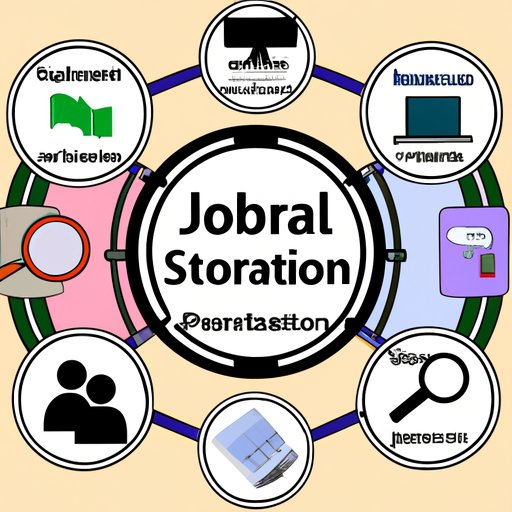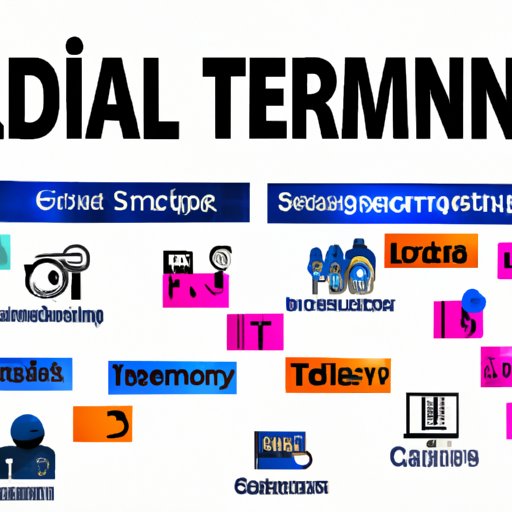Introduction
Information technology (IT) is a rapidly growing field with many exciting career opportunities. From coding and software engineering to network administration and database management, the range of job roles in IT is vast and ever-evolving. If you’re interested in starting a career in this dynamic industry, there are several steps you can take to get started.
In this article, we’ll discuss how to begin a successful career in information technology. We’ll provide an overview of the different job roles and certifications available, explain the skills needed to succeed in the field, and discuss the benefits of earning a degree or certificate. We’ll also cover networking, attending industry events, using online resources, and searching for open positions.

Research the Different Job Roles and Certifications in Information Technology
The first step to beginning a career in information technology is to research the various job roles and certifications available. The IT industry is constantly changing, so it’s important to stay up-to-date on the latest trends and technologies.
According to the Bureau of Labor Statistics, the most common job roles in IT include computer network architects, computer systems analysts, information security analysts, software developers, web developers, and database administrators.1 Each role requires its own unique set of skills and knowledge, so it’s important to determine which one best suits your interests and abilities.
In addition to researching job roles, it’s also important to understand the different certifications available in the field. Certification programs provide a way for individuals to demonstrate their expertise in specific areas of IT. Popular certifications include CompTIA A+, Network+, Security+, Microsoft Certified Solutions Expert (MCSE), and Cisco Certified Network Associate (CCNA).2 Earning certifications can help you stand out from other applicants and can give you an edge in the job market.

Develop Skills Essential for Success in Information Technology
Once you’ve identified the job roles and certifications that interest you, it’s time to start developing the skills needed to succeed in the field. Depending on the type of job you’re pursuing, the skills required may vary. However, there are some basics that all IT professionals should know.
Coding is an essential skill for any IT professional. Whether you’re a software developer or a network engineer, understanding the fundamentals of coding will be beneficial. HTML, CSS, JavaScript, Python, and Java are the most popular programming languages used in the industry.3 It’s important to learn at least one of these languages and become proficient in it.
Network engineering is another important skill for IT professionals. Understanding the fundamentals of networking, such as IP addressing, routing protocols, and switching, will be invaluable in many job roles.4 Additionally, knowing how to configure and troubleshoot network devices is an important skill for any IT professional.
Database administration is another key skill for IT professionals. Understanding the principles of database design, development, and maintenance will be essential for many job roles.5 Knowing how to use popular database management systems like Oracle, SQL Server, and MySQL will also be beneficial.

Consider Earning an IT Degree or Certificate from a College or University
Earning a degree or certificate in information technology can be a great way to jumpstart your career. A degree or certificate program can provide valuable insight into the industry and can equip you with the necessary skills to succeed in the field.
There are several types of IT degrees and certificates available, including associate’s degrees, bachelor’s degrees, master’s degrees, and postgraduate certificates.6 Depending on your goals, you may choose to pursue a specific type of degree or certificate. For example, if you’re interested in becoming a software developer, you may choose to pursue a bachelor’s degree in computer science or a postgraduate certificate in software engineering.
It’s important to consider the cost and time commitment associated with earning a degree or certificate. Depending on the type of program you choose, it could take anywhere from two years to five years to complete.7 Additionally, the cost of tuition varies depending on the institution and the type of program.8 Before committing to a program, make sure to do your research and choose a program that fits your budget and timeline.
Network with Professionals Already Working in the Field
Networking is an essential part of building a successful career in information technology. Connecting with experienced professionals in the field can provide invaluable insights into the industry and can lead to potential job opportunities.
There are several ways to find professionals working in the field. LinkedIn is a great platform for finding and connecting with IT professionals.9 You can also attend local tech meetups and industry events to meet people in the industry. Additionally, many colleges and universities host career fairs where you can connect with recruiters and hiring managers.
Once you’ve connected with professionals in the field, it’s important to maintain these relationships. Reach out to these contacts regularly to stay up-to-date on the latest industry trends and to share your progress. Building strong relationships with these contacts can be beneficial when you’re looking for job opportunities.

Attend Industry Events and Conferences
Attending industry events and conferences is another great way to build connections and stay up-to-date on the latest trends in the field. These events provide an opportunity to network with experienced professionals and learn from industry experts.
There are many resources available for finding tech events and conferences. Meetup.com and Eventbrite are great platforms for finding local tech events.10 Additionally, many cities have their own tech communities, such as Silicon Valley and Seattle, that host regular meetups and conferences.11
When attending an event or conference, it’s important to come prepared. Research the topics that will be discussed and practice introducing yourself to strangers. Additionally, bring business cards and a resume to hand out to potential connections.
Take Advantage of Online Resources and Tutorials
The internet is full of valuable resources for learning about information technology. There are many free and paid online courses, tutorials, and webinars available to help IT professionals stay up-to-date on the latest trends and technologies.
Coursera and Udemy are two popular platforms for taking online courses.12 Both sites offer a wide range of courses covering different topics in IT. Additionally, websites like Codecademy and Free Code Camp provide free online tutorials for learning coding fundamentals.13 Finally, YouTube is a great resource for finding video tutorials and webinars on different topics in IT.
It’s important to stay up-to-date on the latest trends in the field. Taking advantage of online resources and tutorials can help you stay ahead of the competition and increase your chances of success.
Use Online Job Boards to Search for Open Positions in the Field
Once you’ve developed the necessary skills and begun networking, it’s time to start looking for job opportunities. There are several online job boards that specialize in IT jobs, such as Dice, Indeed, and Monster.14 These sites are a great resource for finding open positions in the field.
When applying for jobs, it’s important to tailor your resume and cover letter to each position. Highlight the skills and experience that make you an ideal candidate for the job. Additionally, take the time to research the company and the position you’re applying for. This will give you an edge over other applicants.
It’s also important to follow up after submitting your application. Reach out to the hiring manager to thank them for considering you and inquire about the status of your application. Doing this can show the employer that you’re serious about the position and can increase your chances of landing the job.
Conclusion
Starting a career in information technology can be a daunting task. However, by following the steps outlined in this article, you can get started on the path to success. Research job roles and certifications, develop the necessary skills, consider earning a degree or certificate, network with professionals already in the field, attend industry events and conferences, take advantage of online resources and tutorials, and use online job boards to search for open positions.
By taking the time to prepare and investing in yourself, you can set yourself up for success in the information technology field.
(Note: Is this article not meeting your expectations? Do you have knowledge or insights to share? Unlock new opportunities and expand your reach by joining our authors team. Click Registration to join us and share your expertise with our readers.)
